PEP小学六年级上册英语期末复习资料
- 格式:docx
- 大小:25.63 KB
- 文档页数:8
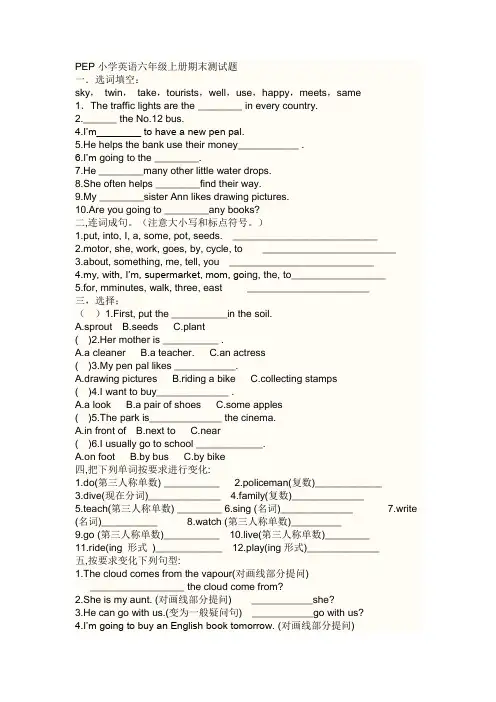
PEP小学英语六年级上册期末测试题
一.选词填空:
sky, twin, take,tourists,well,use,happy,meets,same
1.The traffic lights are the ________ in every country.
2.______ the No.12 bus.
4.I’m________ to have a new pen pal.
5.He helps the bank use their money___________ .
6.I’m going to the ________.
7.He ________many other little water drops.
8.She often helps ________find their way.
9.My ________sister Ann likes drawing pictures.
10.Are you going to ________any books?
二,连词成句。(注意大小写和标点符号。)
1.put, into, I, a, some, pot, seeds. __________________________
2.motor, she, work, goes, by, cycle, to ________________________
3.about, something, me, tell, you __________________________
4.my, with, I’m, supermarket, mom, going, the, to_________________
5.for, mminutes, walk, three, east ______________________
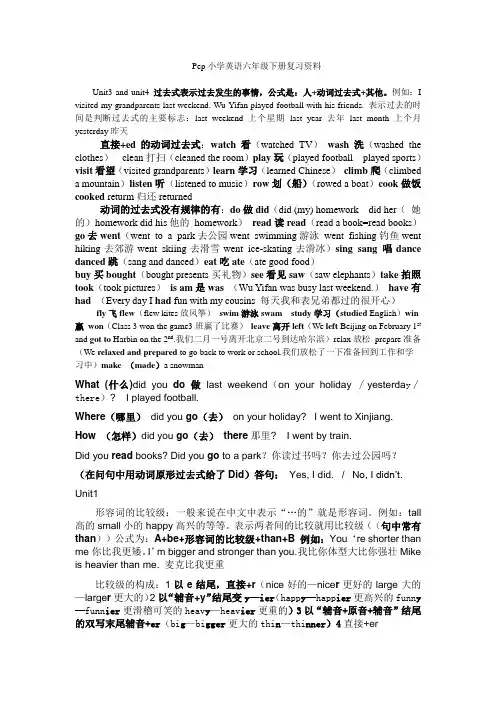
Pep小学英语六年级下册复习资料
Unit3 and unit4 过去式表示过去发生的事情,公式是:人+动词过去式+其他。例如:I
visited my grandparents last weekend. Wu Yifan played football with his friends. 表示过去的时间是判断过去式的主要标志:last weekend上个星期 last year去年last month上个月
yesterday昨天
直接+ed的动词过去式:watch看(watched TV) wash洗(washed the
clothes) clean打扫(cleaned the room)play玩(played football played sports)visit看望(visited grandparents)learn学习(learned Chinese) climb爬(climbed
a mountain)listen听(listened to music)row划(船)(rowed a boat)cook做饭cooked returm归还returned
动词的过去式没有规律的有:do做did(did (my) homework did her( 她的)homework did his他的 homework) read读read(read a book=read books)go去went(went to a park去公园went swimming游泳 went fishing钓鱼went
hiking去郊游went skiing去滑雪went ice-skating去滑冰)sing sang 唱dance
danced跳(sang and danced)eat吃ate(ate good food)
buy买bought(bought presents买礼物)see看见saw(saw elephants)take拍照took(took pictures) is am是was (Wu Yifan was busy last weekend.) have有had (Every day I had fun with my cousins 每天我和表兄弟都过的很开心)
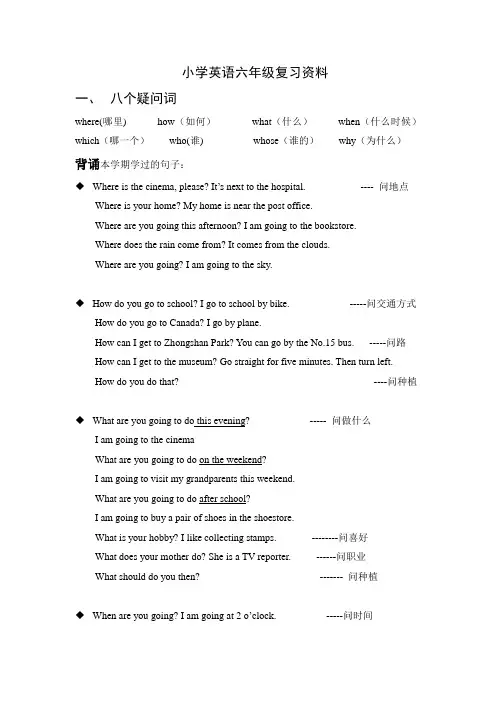
小学英语六年级复习资料
一、 八个疑问词
where(哪里) how(如何) what(什么) when(什么时候)which(哪一个) who(谁) whose(谁的) why(为什么)
背诵本学期学过的句子:
Where is the cinema, please? It’s next to the hospital. ---- 问地点
Where is your home? My home is near the post office.
Where are you going this afternoon? I am going to the bookstore.
Where does the rain come from? It comes from the clouds.
Where are you going? I am going to the sky.
How do you go to school? I go to school by bike. -----问交通方式
How do you go to Canada? I go by plane.
How can I get to Zhongshan Park? You can go by the No.15 bus. -----问路
How can I get to the museum? Go straight for five minutes. Then turn left.
How do you do that? ----问种植
What are you going to do this evening? ----- 问做什么
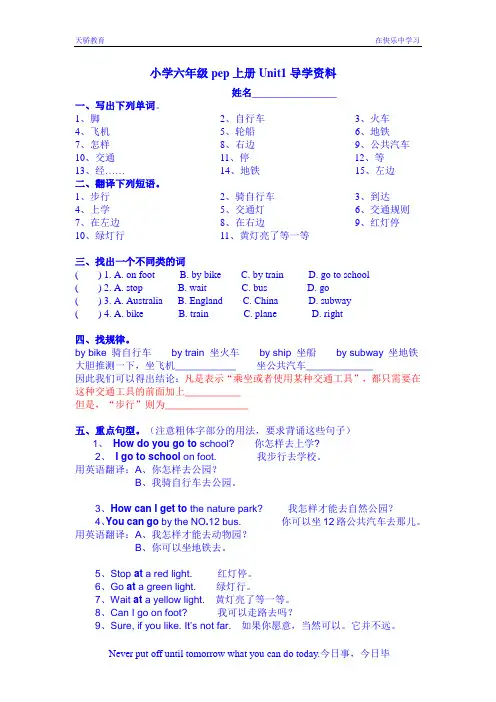
天骄教育 在快乐中学习
Never put off until tomorrow what you can do today.今日事,今日毕 小学六年级pep上册Unit1导学资料
姓名_________________
一、写出下列单词。
1、脚 2、自行车 3、火车
4、飞机 5、轮船 6、地铁
7、怎样 8、右边 9、公共汽车
10、交通 11、停 12、等
13、经…… 14、地铁 15、左边
二、翻译下列短语。
1、步行 2、骑自行车 3、到达
4、上学 5、交通灯 6、交通规则
7、在左边 8、在右边 9、红灯停
10、绿灯行 11、黄灯亮了等一等
三、找出一个不同类的词
( ) 1. A. on foot B. by bike C. by train D. go to school
( ) 2. A. stop B. wait C. bus D. go
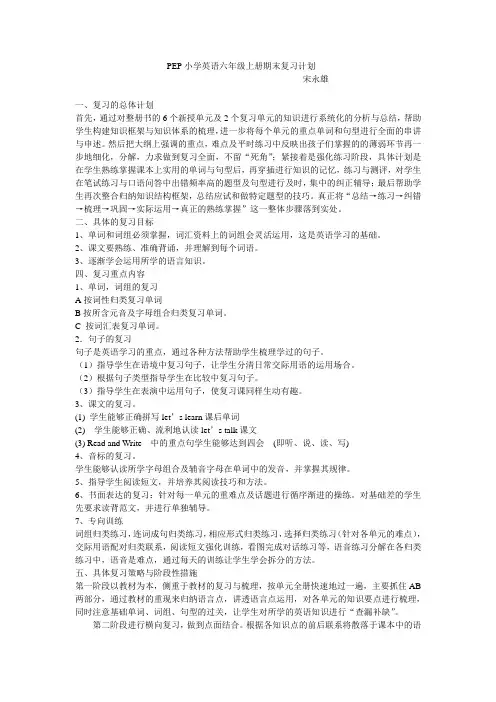
PEP小学英语六年级上册期末复习计划
宋永雄
一、复习的总体计划
首先,通过对整册书的6个新授单元及2个复习单元的知识进行系统化的分析与总结,帮助学生构建知识框架与知识体系的梳理,进一步将每个单元的重点单词和句型进行全面的串讲与申述。然后把大纲上强调的重点,难点及平时练习中反映出孩子们掌握的的薄弱环节再一步地细化,分解,力求做到复习全面,不留“死角”;紧接着是强化练习阶段,具体计划是在学生熟练掌握课本上实用的单词与句型后,再穿插进行知识的记忆,练习与测评,对学生在笔试练习与口语问答中出错频率高的题型及句型进行及时,集中的纠正辅导;最后帮助学生再次整合归纳知识结构框架,总结应试和做特定题型的技巧。真正将“总结→练习→纠错→梳理→巩固→实际运用→真正的熟练掌握”这一整体步骤落到实处。
二、具体的复习目标
1、单词和词组必须掌握,词汇资料上的词组会灵活运用,这是英语学习的基础。
2、课文要熟练、准确背诵,并理解到每个词语。
3、逐渐学会运用所学的语言知识。
四、复习重点内容
1、单词,词组的复习
A按词性归类复习单词
B按所含元音及字母组合归类复习单词。
C 按词汇表复习单词。
2.句子的复习
句子是英语学习的重点,通过各种方法帮助学生梳理学过的句子。
(1)指导学生在语境中复习句子,让学生分清日常交际用语的运用场合。
(2)根据句子类型指导学生在比较中复习句子。
(3)指导学生在表演中运用句子,使复习课同样生动有趣。
3、课文的复习。
(1) 学生能够正确拼写let’s learn课后单词
(2) 学生能够正确、流利地认读let’s talk课文
(3) Read and Write 中的重点句学生能够达到四会 (即听、说、读、写)
4、音标的复习。
学生能够认读所学字母组合及辅音字母在单词中的发音,并掌握其规律。
5、指导学生阅读短文,并培养其阅读技巧和方法。
6、书面表达的复习:针对每一单元的重难点及话题进行循序渐进的操练。对基础差的学生先要求读背范文,并进行单独辅导。
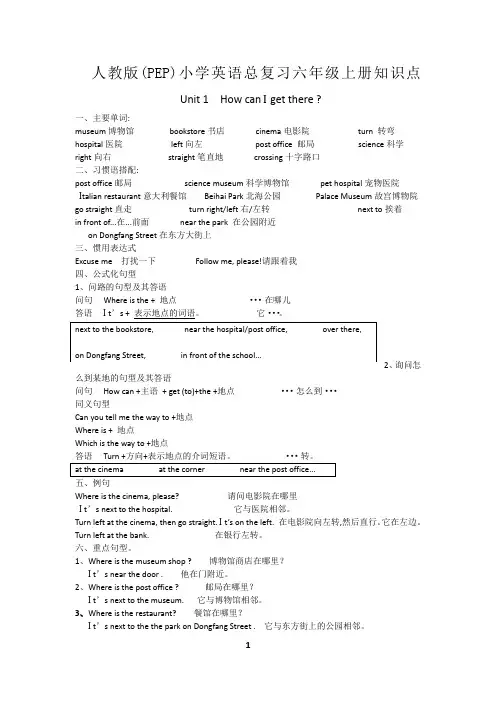
1
人教版(PEP)小学英语总复习六年级上册知识点
Unit 1 How can I get there ?
一、主要单词:
museum博物馆 bookstore书店 cinema电影院 turn 转弯
hospital医院 left向左 post office 邮局 science科学
right向右 straight笔直地 crossing十字路口
二、习惯语搭配:
post office邮局 science museum科学博物馆 pet hospital宠物医院
Italian restaurant意大利餐馆 Beihai Park北海公园 Palace Museum故宫博物院
go straight直走 turn right/left右/左转 next to挨着
in front of...在...前面 near the park 在公园附近
on Dongfang Street在东方大街上 三、惯用表达式
Excuse me 打扰一下 Follow me, please!请跟着我 四、公式化句型
1、问路的句型及其答语 问句Where is the + 地点 ···在哪儿 答语I t’s +
表示地点的词语。 它···。
2、询问怎么到某地的句型及其答语
问句How can +主语 + get (to)+the +地点 ···怎么到···
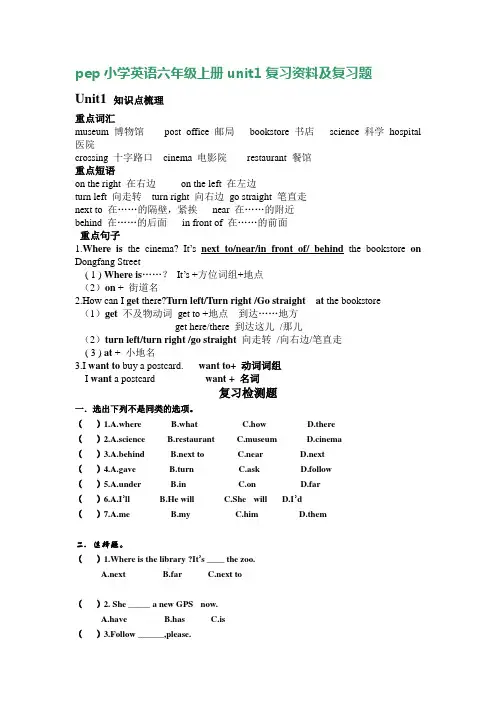
pep小学英语六年级上册unit1复习资料及复习题
Unit1 知识点梳理
重点词汇
museum 博物馆 post office 邮局 bookstore 书店 science 科学 hospital
医院
crossing 十字路口 cinema 电影院 restaurant 餐馆
重点短语
on the right 在右边 on the left 在左边
turn left 向走转 turn right 向右边 go straight 笔直走
next to 在……的隔壁,紧挨 near 在……的附近
behind 在……的后面 in front of 在……的前面
重点句子
1.Where is the cinema? It’s next to/near/in front of/ behind the bookstore on
Dongfang Street
( 1 ) Where is……? It’s +方位词组+地点
(2)on + 街道名
2.How can I get there?Turn left/Turn right /Go straight at the bookstore
(1)get 不及物动词 get to +地点 到达……地方
get here/there 到达这儿 /那儿
(2)turn left/turn right /go straight 向走转 /向右边/笔直走
( 3 ) at + 小地名
3.I want to buy a postcard. want to+ 动词词组
I want a postcard want + 名词
复习检测题
一.选出下列不是同类的选项。
( )1.A.where B.what C.how D.there
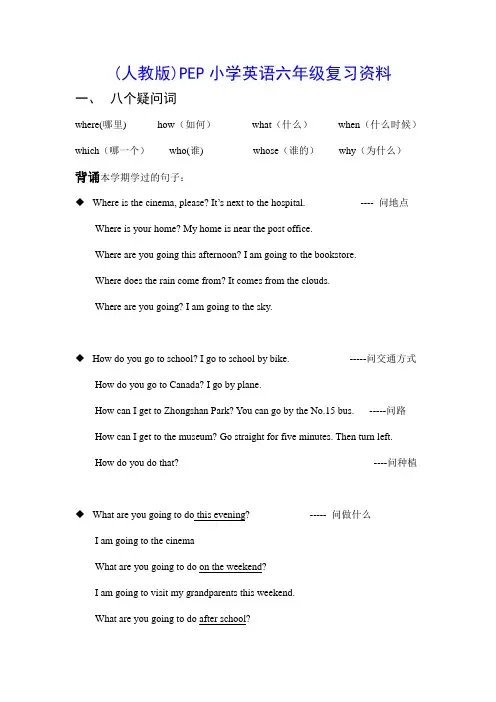
(人教版)PEP小学英语六年级复习资料
一、 八个疑问词
where(哪里) how(如何) what(什么) when(什么时候)which(哪一个) who(谁) whose(谁的) why(为什么)
背诵本学期学过的句子:
Where is the cinema, please? It’s next to the hospital. ---- 问地点
Where is your home? My home is near the post office.
Where are you going this afternoon? I am going to the bookstore.
Where does the rain come from? It comes from the clouds.
Where are you going? I am going to the sky.
How do you go to school? I go to school by bike. -----问交通方式
How do you go to Canada? I go by plane.
How can I get to Zhongshan Park? You can go by the No.15 bus. -----问路
How can I get to the museum? Go straight for five minutes. Then turn left.
How do you do that? ----问种植
What are you going to do this evening? ----- 问做什么
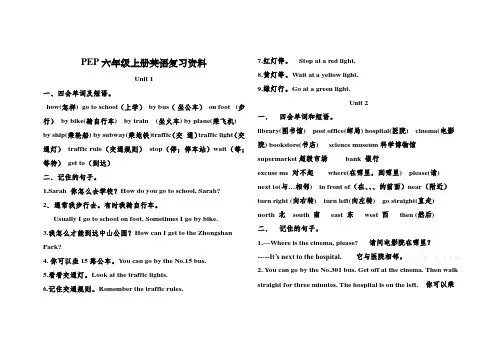
PEP六年级上册英语复习资料
Unit 1
一、四会单词及短语。
how(怎样) go to school(上学) by bus( 坐公车) on foot (步行) by bike(骑自行车) by train (坐火车) by plane(乘飞机)
by ship(乘轮船) by subway(乘地铁)traffic(交 通)traffic light(交通灯) traffic rule(交通规则) stop(停;停车站)wait(等;等待) get to(到达)
二.记住的句子。
1.Sarah 你怎么去学校?How do you go to school, Sarah?
2.通常我步行去。有时我骑自行车。
Usually I go to school on foot. Sometimes I go by bike.
3.我怎么才能到达中山公园?How can I get to the Zhongshan
Park?
4. 你可以坐15路公车。You can go by the No.15 bus.
5.看看交通灯。Look at the traffic lights.
6.记住交通规则。Remember the traffic rules. 7.红灯停。 Stop at a red light.
8.黄灯等。Wait at a yellow light.
9.绿灯行。Go at a green light.
Unit 2
一. 四会单词和短语。
library(图书馆) post office(邮局) hospital(医院) cinema(电影院) bookstore(书店) science museum科学博物馆
supermarket超级市场 bank 银行
excuse me 对不起 where(在哪里,到哪里) please(请)
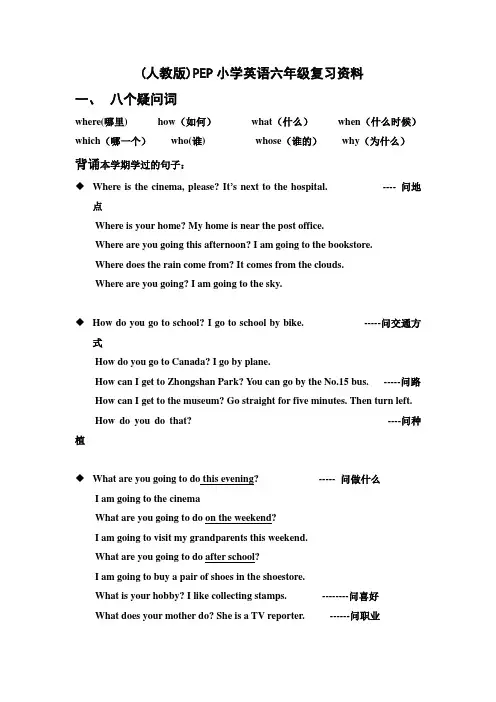
(人教版)PEP小学英语六年级复习资料
一、 八个疑问词
where(哪里) how(如何) what(什么) when(什么时候)which(哪一个) who(谁) whose(谁的) why(为什么)
背诵本学期学过的句子:
Where is the cinema, please? It’s next to the hospital. ---- 问地点
Where is your home? My home is near the post office.
Where are you going this afternoon? I am going to the bookstore.
Where does the rain come from? It comes from the clouds.
Where are you going? I am going to the sky.
How do you go to school? I go to school by bike. -----问交通方式
How do you go to Canada? I go by plane.
How can I get to Zhongshan Park? You can go by the No.15 bus. -----问路
How can I get to the museum? Go straight for five minutes. Then turn left.
How do you do that? ----问种植
What are you going to do this evening? ----- 问做什么
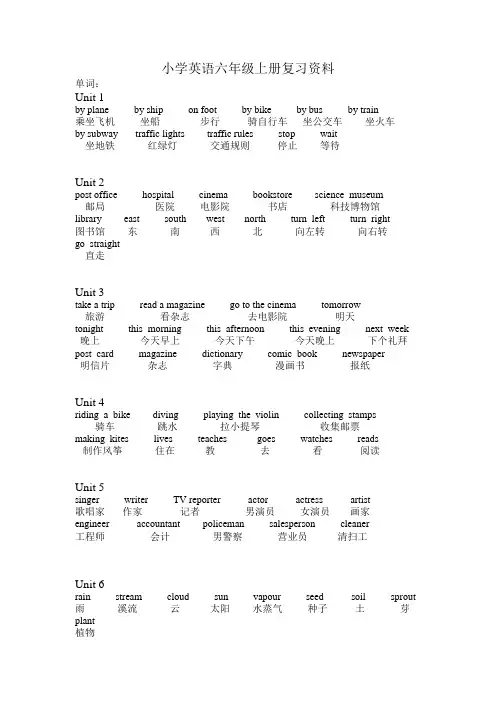
小学英语六年级上册复习资料
单词:
Unit 1
by plane by ship on foot by bike by bus by train
乘坐飞机 坐船 步行 骑自行车 坐公交车 坐火车
by subway traffic lights traffic rules stop wait
坐地铁 红绿灯 交通规则 停止 等待
Unit 2
post office hospital cinema bookstore science museum
邮局 医院 电影院 书店 科技博物馆
library east south west north turn left turn right
图书馆 东 南 西 北 向左转 向右转
go straight
直走
Unit 3
take a trip read a magazine go to the cinema tomorrow
1 PEP六年级下册复习资料
一、每单元知识点归纳
Unit1 How Tall Are You ?
一.形容词的比较级:一般来说在中文中表示“„的”就是形容词。表示两者间的比较就用比较级((句中常有than))公式为:A+be+形容词的比较级+than+B 例如:You‘re shorter than me你比我更矮。I’m bigger and
stronger than you.我比你体型大比你强壮。Mike is heavier than me. 麦克比我更重。比较级的构成:1以e结尾,直接+r(nice好的—nicer更好的large大的—larger更大的)2以“辅音+y”结尾变y—ier(happy—happier更高兴的funny—funnier更滑稽可笑的heavy—heavier更重的)3以“辅音+音+辅音”结尾的双写末尾辅音+er(big—bigger更大的thin—thinner)4直接+er
二. 四会单词:
tall高的—taller更高的 short矮的—shorter 更矮的
thin瘦的—thinner 更瘦的 heavy重的—heavier 更重的
small小的—smaller (体型)更小的 strong强壮的—stronger 更强壮的
old年龄大的—older 年龄更大的 young年轻的—younger 更年轻的
big大的—bigger 更大的 long长的—longer 更长的
四会句子:
1.你有多高?How tall are you? 2.我有1米64高。I'm 164cm tall.
3.你比我矮。You're shorter than me. 4.你比我高4厘米。You're 4 cm
PEP小学英语六年级上册期末复习计划
一、复习的总体计划
首先,通过知识进行系统化的分析与总结,帮助学生构建知识框架与知识体系的梳理,进一步将每个单元的重点单词和句型进行全面的串讲与申述。然后把大纲上强调的重点,难点及平时练习中反映出孩子们掌握的的薄弱环节再一步地细化,分解,力求做到复习全面,不留“死角”;紧接着是强化练习阶段,具体计划是在学生熟练掌握课本上实用的单词与句型后,再穿插进行知识的记忆,练习与测评,对学生在笔试练习与口语问答中出错频率高的题型及句型进行及时,集中的纠正辅导;最后帮助学生再次整合归纳知识结构框架,总结应试和做特定题型的技巧。真正将“总结→练习→纠错→梳理→巩固→实际运用→真正的熟练掌握”这一整体步骤落到实处。
二、复习重点内容
1、单词,词组的复习
A按词性归类复习单词
B按所含元音及字母组合归类复习单词。
C 按词汇表复习单词。
2.句子的复习
句子是英语学习的重点,通过各种方法帮助学生梳理学过的句子。
(1)指导学生在语境中复习句子,让学生分清日常交际用语的运用场合。
(2)根据句子类型指导学生在比较中复习句子。
(3)指导学生在表演中运用句子,使复习课同样生动有趣。
3、课文的复习。
(1) 学生能够正确拼写let’s learn课后单词
(2) 学生能够正确、流利地认读let’s talk课文
(3) Read and Write 中的重点句学生能够达到四会 (即听、说、读、写)
学生能够独立完成相关练习
4、音标的复习。
学生能够认读所学字母组合及学过的字母在单词中的发音,并掌握其规律。
5、指导学生阅读短文,并培养其阅读技巧和方法。 6、书面表达的复习:针对每一单元的重难点及话题进行循序渐进的操练。对基础差的学生先要求读背范文,并进行单独辅导。
三、具体复习策略与阶段性措施
第一阶段以教材为本,侧重于教材的复习与梳理,按单元全册快速地过一遍,主要抓住AB两部分,通过教材的重现来归纳语言点,讲透语言点运用,对各单元的知识要点进行梳理,同时注意基础单词、词组、句型的过关,让学生对所学的英语知识进行“查漏补缺”。
发 音 归 类
/ i: / peak beat team deal tea beach
/ I / pig shop tin dish pin
/ e / kettle get fetch very seven zest
/ æ / cat gas fashion van Sam as fan
/ɑ: / path father Mars. nasty asking
/ a / thumb thus must nut hungry
/ ju:/ use June juice
/ ə:/ shirt learn earth
/ ə / usher pleasure colour mirror
/u:/ woof hook choose loose cool food
/u / wood wolf boot good foot cook
1. a / ei / cake make late later snake lake paper baby
a / æ /apple cat cap bag dad hat map black back
a /ɑ:/ afternoon after banana dance last class
glass grass grandma grandpa ask fast father
a / ə / china another woman breakfast accountant
贵州省金沙县沙土镇第二小学 复习资料 马 艳
PEP小学英语六年级上册复习资料
短语、词组、动词三单形式、动词的ing形式
·at the school在学校 ·near the door 在门旁边 ·next to the museum 紧挨着博物馆
·next to the bookstore 紧挨着书店 ·near the park 在公园附近
·near the Thames在泰晤士河旁边 ·at the science museum 在科学博物馆
·in front of Tian’ anmen 在天安门前面 ·behind the hospital 在医院后面
·go to school 去上学 ·come to school 来上学 ·over there 在那里
·go to work 去工作 ·go home 回家 ·traffic lights 交通信号灯 ·traffic rules交通规则
·go to the cinema 去电影院 ·at the cinema 在电影院 ·in the park 在公园
·at school 在学校 ·at the museum 在博物馆 ·walk straight 直走
·go straight 直走 ·went to school 去上学 ( in front of 在……前面 before 在……前面
)
( behind 在......后面 after 在......后面 ) ·on the left 在左边 ·on the right在右边
·you’re welcome 谢谢 ·go that way 走那条路 ·pay attention to 注意
精品文档 PEP小学英语六年级上册期末复习计划
一、复习的总体计划
首先,通过对整册书的6个新授单元及2个复习单元的知识进行系统化的分析与总结,帮助学生构建知识框架与知识体系的梳理,进一步将每个单元的重点单词和句型进行全面的串讲与申述。然后把大纲上强调的重点,难点及平时练习中反映出孩子们掌握的的薄弱环节再一步地细化,分解,力求做到复习全面,不留“死角”;紧接着是强化练习阶段,具体计划是在学生熟练掌握课本上实用的单词与句型后,再穿插进行知识的记忆,练习与测评,对学生在笔试练习与口语问答中出错频率高的题型及句型进行及时,集中的纠正辅导;最后帮助学生再次整合归纳知识结构框架,总结应试和做特定题型的技巧。真正将“总结→练习→纠错→梳理→巩固→实际运用→真正的熟练掌握”这一整体步骤落到实处。
二、具体的复习目标
1、单词和词组必须掌握,词汇资料上的词组会灵活运用,这是英语学习的基础。
2、课文要熟练、准确背诵,并理解到每个词语。
3、逐渐学会运用所学的语言知识。
四、复习重点内容
1、单词,词组的复习
A按词性归类复习单词
精品文档 B按所含元音及字母组合归类复习单词。
C 按词汇表复习单词。
2.句子的复习
句子是英语学习的重点,通过各种方法帮助学生梳理学过的句子。
(1)指导学生在语境中复习句子,让学生分清日常交际用语的运用场合。
(2)根据句子类型指导学生在比较中复习句子。
(3)指导学生在表演中运用句子,使复习课同样生动有趣。
3、课文的复习。
(1) 学生能够正确拼写let’s learn课后单词
(2) 学生能够正确、流利地认读let’s talk课文
(3) Read and Write 中的重点句学生能够达到四会 (即听、说、读、写)
4、音标的复习。
学生能够认读所学字母组合及辅音字母在单词中的发音,并掌握其规律。
5、指导学生阅读短文,并培养其阅读技巧和方法。
6、书面表达的复习:针对每一单元的重难点及话题进行循序渐进的操练。对基础差的学生先要求读背范文,并进行单独辅导。
PEP六年级上册英语复习资料
Unit 1
一、四会单词及短语。
how(怎样) go to school(上学) by bus( 坐公车) on foot (步行) by bike(骑自行车) by train (坐火车) by plane(乘飞机)
by ship(乘轮船) by subway(乘地铁)traffic(交 通)traffic light(交通灯) traffic rule(交通规则) stop(停;停车站)wait(等;等待) get to(到达)
二.记住的句子。
1.Sarah 你怎么去学校?How do you go to school, Sarah?
2.通常我步行去。有时我骑自行车。
Usually I go to school on foot. Sometimes I go by bike.
3.我怎么才能到达中山公园?How can I get to the Zhongshan
Park?
4. 你可以坐15路公车。You can go by the No.15 bus.
5.看看交通灯。Look at the traffic lights.
6.记住交通规则。Remember the traffic rules. 7.红灯停。 Stop at a red light.
8.黄灯等。Wait at a yellow light.
9.绿灯行。Go at a green light.
Unit 2
一. 四会单词和短语。
library(图书馆) post office(邮局) hospital(医院) cinema(电影院) bookstore(书店) science museum科学博物馆
supermarket超级市场 bank 银行
excuse me 对不起 where(在哪里,到哪里) please(请)
next to(与…相邻) in front of(在、、、的前面)near(附近)
turn right (向右转) turn left(向左转) go straight(直走)
north 北 south 南 east 东 west 西 then (然后)
二. 记住的句子。
1.—Where is the cinema, please? 请问电影院在哪里?
-----It’s next to the hospital. 它与医院相邻。X k B 1 . c o m
2. You can go by the No.301 bus. Get off at the cinema. Then walk
straight for three minutes. The hospital is on the left. 你可以乘301路公交车。在电影院下车。然后笔直往前走三分钟。医院就在左边。
3. Turn left at the cinema, then go straight. It’s on the left.在电影院那里向左转,然后笔直走,它就在左边。
4.Where is the …?
It’s near the … It’s next to the …
It’s in front of the …
It’s east/west/south/north of the …
Unit 3
一、 四会单词和短语。
today 今天 tomorrow明天 tonight今晚 weekend 周末
next week(下周) this morning(今天上午) this afternoon(今天下午)
this evening (今天晚上) take a trip去旅行 read a magazine读杂志 visit grandparents看望祖父母 play sports 做运动read
books读书 clean my room 打扫房间 theme park主题公园
the Great Wall长城 comic book(漫画书) post card(明信片) newspaper(报纸)
magazine杂志 dictionary字典 buy(购买)
二、记住的句子。
1.—What are you going to do on the weekend? 你周末打算做什么?
--I’m going to visit my grandparents this weekend.
我打算去看望我的祖父母。
2.—Where are you going this afternoon?你下午打算去哪里?
--I’m going to the bookstore. 我打算去书店。
--What are you going to buy? 你要去买什么?
--I’m going to buy a comic book. 我想去买一本漫画书。
3.—What are you going to do in 20 year’s time?
20年后你打算做什么?新 课 标 第 一 网
--I’m going to walk on the moon. 我想在月球上走路。
4.When are you going? 你什么时候去?
I am going at 3 o’clock.我3点钟去。
Unit 4
一. 四会单词短语。
hobby(爱好) ride ---riding a bike(骑自行车) dive--diving(跳水)
play —playing the violin(拉小提琴) make—making kites(做风筝)
collect—collecting stamps(集邮) watch---watching TV(看电视)
play---playing football(踢足球) draw—drawing pictures (画画)
listen—listening to music(听音乐)
live –lives(居住) go--goes(去) watch--watches(看)
read--reads(读,看) teach--teaches(教)
二. 记住的句子。
1.—What’s your hobby? 你的爱好是什么?
---I like collecting stamps. 我喜欢集邮。
He likes collecting stamps, too. 他也喜欢集邮。
2.—Does she teach English? 她是教英语的吗?
---No, she doesn’t. /Yes, she does. 不,她不是。/是,她是的。
3.—What does your mother do? 你的妈妈是做什么的? ---She is a TV reporter. 她是一个电视台记者。
4.- --Where does she work? 她在哪里上班?
---She works in a car company. 她在汽车公司上班。
- --How does she go to work? 她怎样去上班的?
---She goes to work by bus. 她乘公交车去上班。
Unit 5
一、四会单词:
singer(歌唱家,歌手) writer(作家) actor(男演员) actress(女演员) artist(画家) TV reporter(电视台记者) student学生
teacher 教师 dancer 舞者 doctor 医生 nurse护士
driver司机 farmer农民 engineer(工程师)
accountant(会计) policeman(男警察) salesperson(销售员)
cleaner(清洁工) worker(工人)
二、记住的句子:
1.—What does your mother do? 你的妈妈是做什么的?
--She is a TV reporter. 她是一个电视台记者。
2--Where does she work? 她在哪里上班? --She works in a car company. 她在汽车公司上班。
--How does she go to work? 她怎样去上班的?
--She goes to work by bus. 她乘公交车去上班。
3、问职业:What does.....do?
4、问在哪儿工作:Where does.....work?
5、问怎样去工作:How does...go to work?
Unit 6
一、四会单词:
rain(雨) cloud (云) sun(太阳) stream(河,溪)
vapour水蒸气 come from(来自,从…来) seed(种子)
soil(土壤) sprout (苗,芽) plant(植物,种植) should (应该) then(然后)
二、记住的句子:
1.—Where does the rain come from? 雨是从哪里来的?
--It’s comes from the clouds. 它来自云。
cloud---rain----water---vapour
2.—How do you do that? 你是怎样做的?
--It’s easy. First, put the seed in the soil.
很简单。 首先,把种子埋到泥土里。
--What should you do then? 然后你应该做些什么?
--Water them. In several days, you can see a sprout.
给它们浇水。几天后,你就可以看见嫩芽了。
重点:
when 什么时候 where哪里 what什么 who 谁
how 怎样 why 为什么 which 哪一个
例子:
1.—How can I get to the zoo? 我怎样去动物园?
--You can ride a bike there. 你可以骑自行车去那里。
2.—Why do you go to school on foot? 为什么你走路去学校?
--Because my home is near. 因为我的家比较近。
3.—Where are you going after lunch? 中饭后你打算去哪里?
--I’m going to the bookstore. 我打算去书店。
4.—When are you going? 你什么时候去?